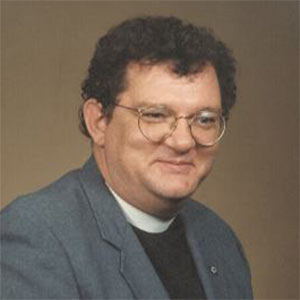A Lifelong Commitment to Learning: The Rev. Michel Clark MDiv ’77 on Leadership, Mentorship, and the Global Impact of LSTC

For the Rev. Michel Clark, Assistant to the Bishop for the West and Southwest Conferences, theological education has been a lifelong pursuit. Reflecting on his time at LSTC, Clark credits the seminary with instilling in him a deep commitment to continuous learning, a practice that has guided him throughout his forty years of parish ministry.
“My time at seminary encouraged a commitment to keep reading,” Clark says. “[My experience there is one reason] why I’ve subscribed to journals over the years and why I paid attention to what’s being published.” His dedication to theological scholarship is rooted in moments of rigorous academic challenge—particularly those that highlighted the depth and complexity of biblical texts.
Beyond the classroom, Clark’s seminary years were defined by lasting friendships and meaningful mentorships. Among them, his bond with Dr. Richard Perry has endured for decades. “We lived next door to each other in the courtyard, and we’ve stayed in touch ever since,” he says. “We trade book recommendations, share information, and talk regularly.” Another pivotal figure in his journey was Pastor Norm Nelson, who supervised his teaching parish. “I attended his funeral, and everyone had the same kinds of stories—his compassion and attention to people were unsurpassed.”
Clark’s ministry has been shaped by an awareness of the church’s global reach, a perspective that has only deepened with time. He recalls a memorable relationship with an international student from Tanzania who pursued his doctorate at LSTC. “They had a little girl named Mission—then another daughter, whom they named Faith,” Clark shares. “Eventually, they returned to Tanzania [bolstered by their education and experiences from their time in seminary]…That’s the kind of global impact LSTC has.”
In his role today, Clark remains committed to equipping new pastors, though he approaches mentorship informally. “I’ve worked with first-call theological education groups, putting together programs for new pastors,” he explains. He also meets biweekly with a synod-authorized minister, offering guidance and encouragement.
Even in retirement, Clark’s passion for ministry persists through supply preaching—though he acknowledges the challenges of navigating a changing ecclesial and social landscape. “Preaching has become more complicated over the years,” he says. “There’s a balance between addressing pressing issues and ensuring that people feel seen and heard. But at the heart of it, the joy is in the people, in walking alongside them in a variety of contexts.”
Yet, despite the complexities, Clark remains drawn to the joy of preaching and connecting with people. His spiritual foundation is rooted in longstanding practices—especially his use of For All the Saints, a four-volume devotional that has guided his prayers and reflections for over 20 years. “It consists of the order for worship for morning prayer, evening prayer, and Compline. There’s an assigned Old Testament, New Testament, and gospel reading, and then there’s always a psalm to be read and prayers,” he says. “I’ve been using that for over two decades, maybe more.”
Looking back, Clark has one piece of advice for his younger self at LSTC: be more diligent. “[I had a habit of taking incompletes in classes], so suddenly instead of four classes, you’ve got maybe five or six that you’re working,” he says, advising against that strategy. But beyond academic discipline, he stresses another crucial lesson: “If you want community, you have to show up.”
As he considers LSTC’s future, Clark believes the seminary’s impact on the church and society is shaped by the lived experiences of its students. “If someone had a positive experience at LSTC, that flows through,” he reflects. As his experience proves, seminary is more than just education; it’s formation. And that formation stays with you for life.